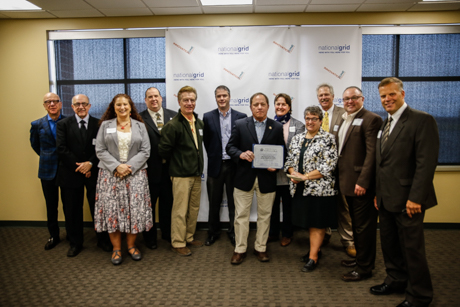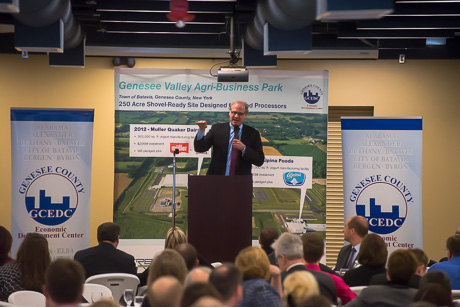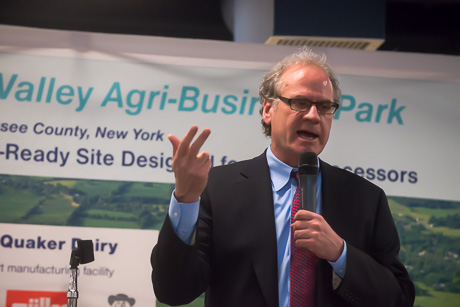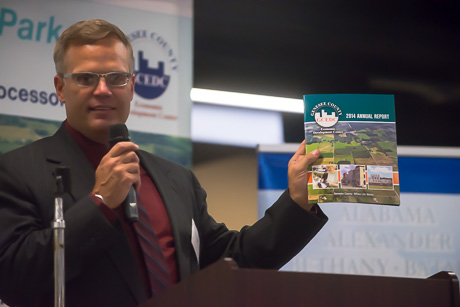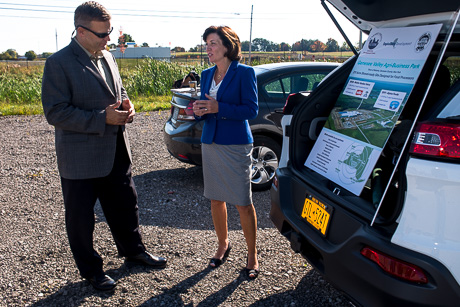A developer seeking to build a senior housing complex in Batavia has filed a lawsuit against the Genesee County Economic Development Center over the board's decision in July to block the project from receiving tax breaks.
The suit alleges that the GCEDC board's decision was "arbitrary and capricious, irrational, an abuse of discretion and affected by an error of law."
The suit calls for a court-ordered reversal of the decision to deny Calamar a public hearing on the project and the proposed tax abatement.
It doesn't ask the court to actually grant the tax breaks. Typically, the GCEDC board votes on whether to grant tax exemptions after a public hearing. Calamar is seeking to present its project to the public and give the public a chance to weigh in on whether it should receive more than $1.4 million in tax breaks for the project.
Calamar has a contract to purchase 33.4 acres at 3989 W. Main Street Road, Batavia. The development plans call for 110 middle-income apartment units rented exclusively to people 55 and older.
The developer, with offices in New York, Canada, Massachusetts and Nebraska, says it plans to invest more than $11 million in the project.
GCEDC's position is that the lawsuit is without merit.
Here is a statement provided by Rachael J. Tabelski, marketing and communications director for GCEDC:
The Genesee County Economic Development Center is in receipt of a notice of a file of claim against our organization by Calamar Enterprises as a result of a recent vote by the GCEDC board.
We believe the allegations in the claim are without merit and will be determined by the courts as such.
As this is a legal matter, the GCEDC will have no further comment.
The suit implies that Calamar was misled about GCEDC's willingness to support the project and that the board's decision went both against GCEDC's own policy and prior approvals for similar projects.
The project was first presented to the board by Mark Masse, VP of operations for GCEDC, in February. Masse said during the meeting, according to a quote in Calamar's petition, that he was looking for feedback from the board.
Calamar said that GCEDC's attorney told the board that although the project wasn't manufacturing, "This project is authorized and allowable under IDA law."
At a March 6 meeting, CEO Steve Hyde reportedly informed the board that GCEDC had participated in housing projects previously, such as the Manor House and the Jerome Center.
The petition claims that Masse continued to work closely with Calamar officials on project plans and proposed tax incentives in the following months.
At a staff meeting in June, the petition states, Masse gave every indication the project would get a green light.
"At no time during this meeting did Mr. Masse state that the Agency had concerns about the Project or was unwilling to support the Project," the document states. "To the contrary, all statements made and actions taken by Mr. Masse indicated that the Project had the support of the GCEDC, justifying the significant investment of time and resources by Calamar."
The project was put before the board July 10 for approval of a public hearing.
The board voted to deny Calamar a public hearing on the project and Calamar is accusing two board members of a conflict of interest on the project.
Pete Zeliff (mistakenly named "Paul" in the petition,) and Ray Cianfrini both spoke against tax breaks for the project and voted against setting a public hearing.
The conflict arises, according to Calamar, because Zeliff is building a single-family residential project on East Main Road, Batavia, and Cianfrini, also chair of the Genesee County Legislature, sometimes provides legal counsel to Zeliff.
"The agency's mission is to further the development of industries and create jobs and that housing should stand on its own," Calamar quotes Zeliff as saying.
Calamar claims to have been unaware of Zeliff's development interests at the time of the meeting.
To further emphasize the alleged conflict, Calamar quotes from a story published in The Batavian where Zeliff denies there is a conflict.
In that story, Zeliff noted that the two projects are completely different and do not overlap intended housing markets. Calamar is building apartments for seniors. Zeliff is building houses for families.
The petition states, "Zeliff also acknowledged that competition was an issue influencing his vote," and goes on to say that Zeliff voted against the project to protect his own Oakwood Estates development.
The characterization of what Zeliff told The Batavian is misleading. Zeliff drew the distinction between his own project and said he didn't see Calamar's project as competitive with it, but noted that another senior housing project, Clinton Crossing, has proceeded without government aid and has a waiting list of residents trying to move in. He said the Calamar project, if it received assistance, would have an unfair, subsidized advantage over Clinton Crossing.
Zeliff does not have a financial interest in Clinton Crossing.
The suit also criticizes Zeliff and Cianfrini for misstating how many jobs the project would create.
Rather than just two jobs, Calamar claims the project would add 4.5 full-time equivalent non-employee jobs (contractors) as well as dozens of construction jobs during the project development.
The rejection, the petition states, was taken "without any findings or reasoning," which Calamar claims is required if the board is going against either past practices or policy.
Calamar is also critical of GCEDC for having a vague Uniform Tax Exemption Policy (UTEP), and notes that the state's comptroller's office had the same criticism of GCEDC earlier this year.
"The Comptroller found that this failure to have formalized evaluation criteria resulted in an inconsistent approach by the Board and a lack of objective evaluation of proposed projects," the petition states.
Calamar claims to have received tax incentives for similar projects in Niagara County, Erie County, Stueben County and Auburn.
There is a great need in Genesee County for such a project, Calamar tells the court. According to the 2010 Census, 28.5 percent of the local population is 55 or older and 23.7 percent is 40 to 55.
The Genesee County Housing Focus Group's strategic plan states, according to Calamar, "senior apartment shortages have been noted as a major concern."
Calamar's project would be marketed to people 55 and older with an annual income of $35,000 to $45,000, and residents would only be those not receiving government housing assistance.
The 117,000-square-foot facility would offer one and two bedroom apartments with rents from $805 to $1,050 per month. There would be a full-time director on site, with events, educational seminars, meals, exercise instruction, home helpers, cleaning services, health system services and transportation offered.
The 33 acres of the proposed project is currently assessed at $166,400. The anticipated increase in assessed value is not stated, but the total value of the PILOT would be $854,580, with Calamar paying 20 percent of the taxes on the increase in assessed value in the first year. Calamar would pay an increasing share of taxes up to 100 percent by year 11.
Other proposed tax abatements are $454,744 on sales tax for materials and an exemption of the $120,000 mortgage tax on the purchase of the property.
The suit claims both Masse and GCEDC attorney Russ Gaenzle were shocked by the board's vote and exhibits include copies of their e-mails.
No hearing date has been set yet for the suit.
